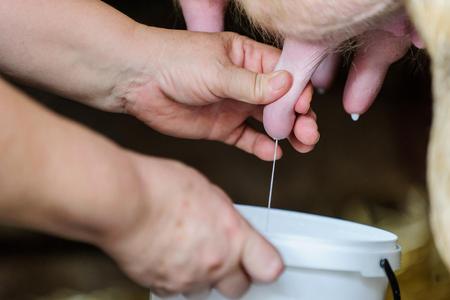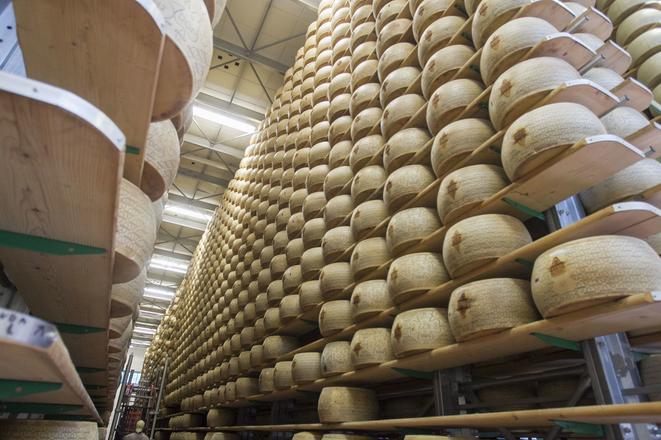While carmaker PSA Peugeot Citroën Slovakia, its suppliers and Slovak branches of French construction, logistics and service companies experienced decent development in 2016 and their numbers are expected to increase in 2017, the Slovak market is still much less interesting for French food producers.
The total number of businesses with French ownership in Slovakia jumped from about 120 in 1999 to nearly 400 in 2016. However, commerce authorities reckon only five which have produced food and inputs for the food industry since 1993, when Slovakia became independent.
“We can count the total number of food companies in any given period on the fingers of one hand,” Dušan Huszár, manager of the business service department of the French-Slovak Chamber of Commerce (FSOK), told The Slovak Spectator.
Dairy dominates
Currently, there are only three French-owned food producing facilities in Slovakia, of which two belong to multinational dairy groups. The Bel group produces cheese products in Michalovce (eastern Slovakia) and Savencia, owned by family business, Bongrain, in Liptovský Mikuláš (northern Slovakia).
In addition to dairy companies, Weishardt Group produces gelatine for food, pharmaceutical and technical use in the affiliated company GeLiMa in Liptovský Mikuláš, according to Huszár.
The Bel group has been active in 130 countries and produces cheese products in 28 facilities around the world. The company entered the Slovak market when it acquired the former company Zempmilk in Michalovce in 2000. The factory makes and distributes the well-known cheese brands Babybel, Leerdamer, Kiri, and others, and recorded a turnover of almost €74 million in 2015, according to the TASR newswire.
At the time, the acquisition of the factory was one with the potential to open new business opportunities for Bel in central and eastern Europe, according to Boyan Neytchev, managing director of Bel Central Europe.
“Those opportunities were related to possibilities to expand the markets for the Bel brands as well as possibilities to acquire great local brands like Karička and develop production capacities in this region,” Neytchev told The Slovak Spectator.
Business opportunities
Bel still owns the factory in Michalovce, seeing that the country offers highly qualified employees with flexibility and an innovative spirit. The factors influencing the decision to do business in Slovakia are fully linked with the business strategy and the potential to develop markets with growth opportunities, said Neytchev.
“From a business point of view, the country is steadily growing and thus provides many business opportunities,” Neytchev said.
Martin Buršák, plant director of Bel Slovakia, pointed out that local Slovak business represents around 25 percent of Bel’s production in Michalovce, while the other 75 percent is dedicated to exports.
“This has a very positive impact on our Slovak suppliers as thanks to the Bel distribution network, they can access many countries in Europe and around the world,” Buršák told The Slovak Spectator.
Government support
Slovak authorities support Bel to maintain and increase job opportunities in eastern Slovakia. In March 2016, the Economy Ministry approved state aid for the company in the direct amount of €450,000 to expand technology and €950,000 in the form of tax relief. Bel uses the aid to increase the production capacity of the Mini Babybel cheese with total costs reaching €4.25 million, TASR wrote.
While the state aid was one of the several criteria that were taken into account when making the decision to increase production from just over 5,000 tonnes to more than 8,000 tonnes, it shows the interest of the Slovak government to support food business investments in eastern Slovakia, said Neytchev.
“On the other hand, it is also our commitment towards increasing employment and stabilising and even increasing the milk supply from farmers located mainly in the region,” Neytchev said.

Under the contract, Bel must maintain the investment along with 50 created jobs for five years. Now, the factory provides work for 500 employees and processes 80 million litres of milk per year, mainly from local primary producers, the public broadcaster RTVS reported.
Another dairy changed its name
Meanwhile, another Slovak cheese producer Milex, run by the French family company Bongrain, started the year 2016 with a new name, Savencia Fromage & Dairy SK. The name change should help the company to become more internationally visible and emphasize its values, the SITA newswire reported.
While Bongrain decided to change names and streamline the production of all of its world-wide subsidiaries, it reduced the original five Czech and Slovak legal entities to two, said Miroslav Maňásek, director of Savencia Fromage & Dairy for the Czech and Slovak market.
“We have entered the year 2016 as a company fully integrated into the European industry structure of Savencia group,” said Maňásek, as quoted by SITA.
The factory in Liptovský Mikuláš produces cheese and dairy products for the brands Liptov, Lučina, Pribináček and Sedlčanský. Along with Czech factories in Sedlčany, Přibyslav and Hodonín, the company employs almost 1,200 employees and its annual revenue reached more than €111 million in the Czech Republic and €54 million in Slovakia, SITA wrote.
More plants in the past
In the history of independent Slovakia, there have been two more French food companies. One of the world’s biggest dairy companies, Danone, produced yoghurts in Modranka (Trnava Region) between the years 2000-2006. After the Slovak plant was closed down, the company now keeps only its sales department in the country.
Danone withdrew its production from Slovakia due to inability to get a foothold in the market after the food sector crisis in 2006.
While the majority of its then 73 employees switched to other employers in the region, other workers found employment in the company’s plants in the Czech Republic, the Hospodárske Noviny daily wrote.
Another French dairy firm, Senoble, manufactured yoghurts in Zvolenská Mliekareň in Zvolen. However, in 2015 the company sold the operation to the US company Schreiber Foods, according to Huszár.
“Senoble was unable to break into the strong competitive environment in the neighbouring countries and the Slovak market was too small for such a company,” said Huszár.
Positive development
Though several dairy companies left Slovakia due to lacking capacity to compete on the market, Bel and Savencia have decided to remain in Slovakia. Bel authorities are very optimistic about the future of the Slovak market mainly due to its great macroeconomic figures, growth and generally very positive conditions for business in the country.
“We believe that this positive context will continue to fuel also the demand for high quality cheeses of the type we are proud to produce,” Buršák said.



 Illustration stock photo. (source: Sme)
Illustration stock photo. (source: Sme)